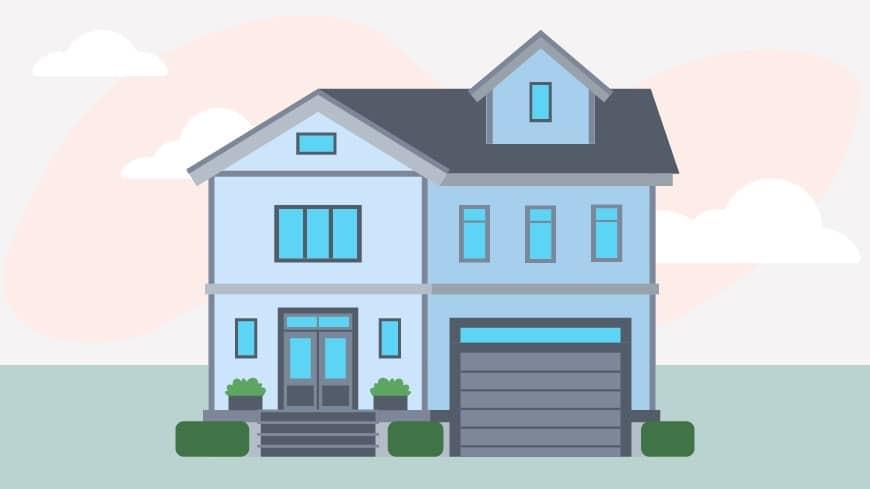FHA vs Conventional Loans: Benefits & Differences

Buying a home is one of the biggest decisions you'll ever make and the loan you choose matters a lot. Whether you're a first-time buyer or just exploring your options, it’s easy to feel overwhelmed by all the choices.
When it comes to choosing between FHA mortgage vs conventional loans, it really comes down to one thing: figuring out which loan fits your unique situation.
So, let’s break down the benefits and differences between FHA and conventional loans. And if you’re ready to move forward, Rate’s tailored loan options through our Same Day Mortgage pre-approval can help you get started quickly and confidently.
Conventional Loan vs FHA Loan: What’s the Difference?
When it comes to FHA loans and conventional loans, there’s no “one size fits all.” FHA loans are backed by the Federal Housing Administration (so they’re government-backed).
One of the major benefits of FHA loan programs is the flexibility it offers for people with a limited credit history or a higher debt-to-income ratio (DTI).
On the contrary, if you have a higher credit score and you’re able to make a down payment of 20%, a conventional loan might be the way to go. It’s not government-backed, which means you’ll likely need a better credit score to qualify. But you also avoid some of the extra costs, like an upfront mortgage insurance premium that comes with FHA loans. Both loans have their perks—it's really about what fits your specific financial situation.
Is It Better to Go FHA or Conventional?
So, what is the difference between FHA and conventional loan? It comes down to your unique situation.
If you don’t have enough for a larger down payment, a FHA might feel like a lifesaver because you can qualify with as little as 3.5% down.
But if you have a solid credit score and can put down at least 5% to 20%, a conventional mortgage may offer you better interest rates and help you avoid PMI (private mortgage insurance), but the overall cost savings depend on factors like loan terms, interest rates, and equity accumulation.
Government-Backed vs Non-government-Backed Loans
One major difference between conventional and FHA loan programs is the type of backing each loan has.
FHA loans (and even USDA loans) are government-backed, meaning they’re insured by a federal agency—HUD (Housing and Urban Development)—which allows lenders to take on more risk and offer better terms to borrowers who might not qualify for conventional loans.
Conventional loans, on the other hand, are not backed by any government agency. That makes them riskier for lenders, but they’re still popular with borrowers who can meet the higher requirements.
Borrower Profiles and Qualification Differences
Wondering who should go for an FHA loan? If you have a lower credit score, a higher DTI ratio, or limited savings for a down payment, you’re more likely to qualify for an FHA loan.
On the other hand, conventional loans favor borrowers with higher credit scores and lower DTI ratios. Your financial situation and how strong your credit history is will determine which loan would work for you.
What Are Conventional Loans?
A conventional loan is any type of loan not insured or guaranteed by a government agency, like FHA or VA loans. These loans are typically the preferred option for borrowers with stronger credit profiles and a larger down payment amount. Because conventional loans aren’t government-backed, lenders require stricter qualifying criteria.
However, the trade-off is the potential for more competitive interest rates and avoiding the extra costs of mortgage insurance premium that are mandatory with an FHA mortgage.
Conventional loans are ideal for homeowners who want flexibility, especially when purchasing a primary residence or an investment property.
They can also be a good fit for those looking at larger properties, including those that exceed the conforming loan limits, also known as jumbo loans.
For high-value homes, jumbo loans offer a financing option without adhering to the typical limits set by Fannie Mae or Freddie Mac.
What Credit Score Do You Need for a Conventional Mortgage Loan?
The higher your score, the better your chances of receiving lower interest rates. For the best loan terms, aim for a score above 740.
A strong credit score not only helps reduce the overall cost of your home loan but also increases the chances of avoiding additional costs like private mortgage insurance (PMI), which is required if your loan-to-value ratio exceeds 80%.
Conventional Loan Down Payment
Most conventional loans require at least a 5% down payment amount, but to avoid PMI, a larger percentage down payment is ideal. The size of your down payment significantly impacts your monthly payments, mortgage rates, and overall interest paid over the loan term.
If you don’t meet the 20% threshold, you’ll have to pay PMI. But PMI can be canceled once your loan-to-value ratio drops below 80%, but this may require an appraisal and is subject to lender policies. Borrowers should check with their lender for specific requirements.
Conventional Loan Limits
The loan limits for conventional loans are governed by the Federal Housing Finance Agency (FHFA). In 2024, the conforming loan limit for a single-family home is $766,550 in most parts of the U.S.
In high-cost areas, this amount can be higher, depending on the home’s value and purchase price. For properties that exceed these limits, jumbo loans become necessary.
Unlike conventional loans, jumbo loans are non-conforming, meaning they don’t follow Freddie Mac and Fannie Mae guidelines, resulting in stricter requirements.
Conventional Loan Mortgage Insurance
If your down payment amount is less than 20%, you’ll need to pay PMI, which protects the lender in case of foreclosure.
Unlike the FHA mortgage insurance that lasts the entire loan term, PMI can be canceled once you build 20% equity. This flexibility is one of the major perks of conventional loans.
Additionally, your monthly mortgage payments may be lower once PMI is removed, reducing your overall cost of the loan.
What Are FHA Loans?
An FHA loan is a government-backed mortgage offered by FHA-approved lenders, designed to help borrowers who may not qualify for conventional loans due to a lower credit score or smaller down payment.
FHA loans are especially popular with first-time homebuyers and those working to rebuild their credit history. With an FHA loan, you can make a down payment as low as 3.5%, making homeownership more accessible for people with limited savings.
FHA loan limits are set based on the area in which you’re purchasing your home. FHA loan limits are set to control the maximum loan amount available in specific regions, but affordability depends on other factors like the borrower’s income, debt levels, and loan terms.
Do you want to get started on an FHA loan? Check out our FHA mortgage calculator to get a better idea of what your monthly payment could look like.
FHA Loan Credit Score Requirements
To qualify for the 3.5% down payment option, borrowers need a minimum credit score of 580. However, if your score falls between 500 and 579, you can still qualify with a 10% down payment.
This flexibility makes FHA loans ideal for borrowers with lower credit scores who may not meet the stricter requirements of a conventional loan.
Additionally, the Federal Housing Administration ensures that lenders are more forgiving of higher debt-to-income ratios (DTI).
FHA Loan Down Payment
One of the biggest advantages of an FHA mortgage is its low down payment requirement. With a credit score of 580 or higher, you can secure a home with just 3.5% down.
This is especially beneficial for first-time buyers and those looking to avoid depleting their savings. Plus, unlike conventional loans, FHA loans allow you to use gift funds for the down payment amount. Borrowers using gift funds must provide documentation showing the source of the funds and meet FHA eligibility requirements.
FHA Loan Mortgage Insurance
With an FHA loan, you’re required to pay both an upfront mortgage insurance premium (MIP) and an annual MIP. The upfront MIP is typically 1.75% of the loan amount, and you’ll pay this either at closing or rolled into the loan.
Additionally, borrowers must pay the annual MIP for the life of the loan, regardless of their loan-to-value ratio. This makes mortgage insurance a long-term cost with FHA loans, unlike the cancellable PMI on conventional loans.
Conventional vs FHA Loans: Benefits and Differences
Knowing the difference between these two popular options can help you make a decision.
What Are the Eligibility Differences Between FHA and Conventional Loans?
FHA loans are more flexible when it comes to credit scores and minimum down payment. These loans often require a credit score as low as 580 and a down payment of only 3.5% based on the FHA appraisal.
On the other hand, conventional loans typically require higher credit scores and a larger down payment, making them less accessible for some buyers. Mortgage lenders often prefer borrowers with better credit profiles for conventional loans, as they pose lower risks.
What Are the Pros and Cons of FHA Loan vs Conventional Mortgage?
The key differences between the FHA and conventional type of mortgages include their requirements and potential costs.
FHA loans are great for those with lower credit scores or limited funds for a down payment, but they come with higher interest rates and mandatory mortgage insurance throughout the life of the loan.
Conversely, conventional loans can save you money in the long run if you can meet their stricter standards, especially if you can avoid paying PMI (private mortgage insurance) once you reach 20% equity in your home.
Mortgage Insurance: FHA vs Conventional Loans
FHA loans require mortgage insurance premiums for the life of the loan, which can add to your monthly costs.
In contrast, conventional loans allow you to eliminate PMI once you build sufficient home equity. This can lead to lower monthly payments, especially beneficial if you decide to refinance later.
FHA or Conventional Loan: Which Is Better?
Choosing between an FHA loan and a conventional loan depends on your financial situation.
If you’re a first-time homebuyer, have a lower credit score, or lack savings for a large down payment, an FHA loan might be a better option.
However, if you are refinancing or have a higher credit score and can afford a bigger down payment, a conventional loan could offer lower overall costs and more flexibility.
How Can I Get Pre-approved for an FHA or Conventional Mortgage?
Getting pre-approved is a crucial first step. You’ll need to provide your loan officer with documentation like proof of income, tax returns, and details about your debts, including any credit cards.
This documentation is essential for starting the underwriting process. With pre-approval, you’ll have a clearer sense of your budget, making your offer more appealing to sellers.
Benefits of Pre-approval with Rate
One significant benefit of getting pre-approved with Rate is our Same Day Mortgage pre-approvals, allowing you to know how much home you may qualify for within 24 hours.
This fast turnaround can give you an edge in a competitive real estate market and help you navigate various loan programs effectively.
Ready to find the most suitable loan option for you? Explore our tailored solutions today and take the first step toward your new home!
Guaranteed Rate, Inc. is a private corporation organized under the laws of the State of Delaware. It has no affiliation with the US Department of Housing and Urban Development, the US Department of Veterans Affairs, the US Department of Agriculture, or any other government agency.
Guaranteed Rate, Inc’s Same Day Mortgage promotion offers qualified customers who provide certain required financial information/documentation within 24 hours of locking a rate on a mortgage loan the opportunity to receive a loan approval within 1 business day of timely submission of documentation and does not suggest that the borrower will receive funding on the same day as their application submission. Guaranteed Rate, Inc cannot guarantee that a loan will be approved or that a closing will occur within a specific timeframe. Applicant subject to credit and underwriting approval. Restrictions apply. Visit rate.com/same-day-mortgage for terms and conditions.




